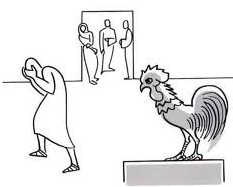
For (1) if we died together,
we shall be living together also;
(2) if we are enduring,
we shall be reigning together also;
(3) if we are disowning,
He also will be disowning us;
(4) if we are disbelieving,
He is remaining faithful –
He cannot disown Himself.
2Timothy 2:11-13
Four times, the little word "if" occurs in the above passage. The third occurrence, in the sentence shown in bold, can easily sound in our ears as a dissonant. The previous two declarations are rich in promise and the same can be said of the last comment. But what is the third remark doing, in between? Is it not strange that, on the one hand, our disowning is answered with His disowing, while our unfaithfulness is answered with His faithfulness? Is, with this, the warning canceled by a promise?
We are, undoubtedly, moving in the right direction when we note that the third and fourth assertions run parallel. So that, "He remains faithful" is an elucidation on "He will disown us". This also explains why the fourth assertion is concluded with "He can not disown Himself". That is, He disowns us, if necessary, but Himself, never.
In what sense will the Lord disown us? Would He ever be able to disown those whom He owns? That would, of course, be infidelity on His part! That cannot be. Our unbelief cannot nullify His faithfulness (Rom.3:3, 4). No, his disowning concerns our disowning. As wood, hay and straw, our disowning, will, at the bema (= the podium; 2Cor.5:10) go up in smoke (Cor.3:12-15). It will not count. He does not know it. This is not a dissonant, but a promise!
… if we are disbelieving,
He is remaining faithful –
He cannot disown Himself.
———————————
Translation: Peter Feddema

